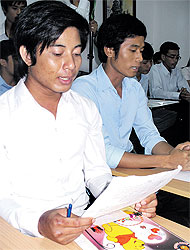 Kaom Sokharoth, left, sings a Thai song in his basic Thai language class. ANUCHA CHAROENPO
Kaom Sokharoth, left, sings a Thai song in his basic Thai language class. ANUCHA CHAROENPOThai language course offers Cambodian students better hopes for the future
Published: 9/04/2012
Writer: Anucha Charoenpo
Bangkok Post
Kaom Sokharoth, a third-year student from the Royal University of Phnom Penh's faculty of literature, hopes studying Thai will help change his life.
The 21-year-old student has just enrolled in a basic Thai language course at the RUPP's Institute of Foreign Languages (IFL), but surprisingly he is able to listen, speak, read and write Thai fairly well.
He said he practices every day by watching Thai movies and listening to Thai songs and by speaking with Thai people in Phnom Penh.
Mr Sokharoth is among 81 Cambodian students studying Level 1 of the course.
"I chose to study the Thai language because I would like to work in Thailand or in a Thai-owned company in Phnom Penh.
"I've heard that anyone with a good command of the Thai language will have a better chance of earning a bigger salary," he said in Thai.
Mr Sokharoth said he knows former students who have studied Thai at the IFL.
These people are now working for Thai-owned companies in Phnom Penh and are earning more than those working in Cambodian firms, he said.
The university's IFL provides four Thai language courses. They each consist of four levels: Level 1, for beginners studying basic Thai; Level 2, pre-intermediate; Level 3, intermediate; and Level 4, upper intermediate.
Each level requires a student to undergo 180 hours of tuition within nine months. After completing each level a student will get a certificate which will help him or her when applying for jobs.
Students can currently choose Thai as an option. But as of next year it will become a minor subject for all students studying at Cambodia's oldest and largest university.
Associate Professor Phumjit Ruangdej, a Thai language teacher at the IFL, said the non-degree courses have been available at the university since 2005 under a joint agreement between the RUPP, Thailand's Ministry of Foreign Affairs and Buri Ram Rajabhat University.
The reason for providing the courses was to promote ties between Thailand and Cambodia, Mrs Phumjit said.
Since it began, over 650 Cambodian students have enrolled on the Thai courses.
Many of those who have completed them have landed jobs in places such as the Thai embassy in Phnom Penh and Thai-owned companies in the capital and in border provinces.
A few have won masters and doctoral scholarships to study at Thai universities, she said.
Mrs Phumjit said the need for people who are able to speak Thai in Cambodia has been increasing with growing investment, the expansion of the country's tourism industry and closer Thai-Cambodian relations.
She said this need will continue for the foreseeable future. Cambodian students with Thai language skills are still able to apply for various jobs with Thai employers in Phnom Penh and other cities in Cambodia.
"And I am certain many more Thai businessmen will invest in Cambodia after the region becomes a single market in 2015, and when that time arrives, Cambodian students who have Thai language skills will benefit greatly," she said.
Suos Man, the vice-rector of the RUPP and overseer of the IFL, said the Thai language department at the institute is popular among students as they are confident they will get a well-paid job at Thai-owned companies.
Man said the IFL agreed to provide the Thai language course because it saw the advantages it would give Cambodian students. She said she also wants to see as many as possible speaking Thai so they will have a better understanding of Thailand and its people.
Soleam Kong, 22, a third-year Khmer language student, is studying the basic Thai course. She said she is from Banteay Meancheay, a Cambodian province across the border from Sa Kaeo's Aranyaprathet district, where many people can speak Thai.
"I can speak Thai, but I can't read or write. That's why I'm taking the course, so I can learn more about Thailand and Thai people," she said.

3 comments:
It is okay to learn Thia, but English is a lot better. Even a can of Cokes is written in English, not Thai.
Post a Comment